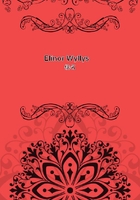
第207章
Clapp was not heard of for years. His wife, little Willie, and two younger children, became inmates of the old grey cottage, under the care of Miss Patsey, who still continues the same honest, whole-souled, benevolent being she was years ago. Patsey was now quite at her ease, and enabled to provide for her sister Kate and the three children, and it was to poor Charlie she owed the means of doing so; by an unusual precaution in one so young, he had left a will, giving everything he owned to his mother and eldest sister. Shortly after his death, some of his friends, Hazlehurst among the number, got up an exhibition of all his pictures; they made a fine and quite numerous collection, for Charlie had painted very rapidly. The melancholy interest connected with the young painter's name, his high reputation in the particular field he had chosen, the fact that all his paintings were collected together, from the first view of Chewattan lake taken when a mere boy, to the sketch of Nantucket which he was retouching but a moment before his death, and the sad recollection that his palette was now broken for ever, attracted unusual attention. The result of that melancholy exhibition, with the sale of some remaining pictures, proved sufficient to place his mother and sister, with their moderate views, in very comfortable circumstances; thus even after his death Charlie proved a blessing to his family. In looking over the young man's papers, Patsey found some lines which surprised her, although they explained several circumstances which she had never before fully understood; they betrayed a secret, undeclared attachment, which had expressed itself simply and gracefully in verses full of feeling and well written. It was evident from these lines that poor Charlie's poetical imagination, even from early boyhood, had been filled with the lovely image of his young companion, Jane Graham: there was a beautiful sketch of her face among his papers, which from the date, must have been taken from memory while she was in Paris. It was clear from the tone of the verses, that Charlie had scrupulously confined his secret within his own bosom, for there were a few lines addressed to Jane since her widowhood, lamenting that grief should so soon have thrown a shadow over that lovely head, and concluding with a fear that she would little value even this expression of sympathy from one, to whom she had only given careless indifference, and one who had never asked more than the friendship of early companionship.
Patsey hesitated for a moment, but then decided that the miniature and the verses should never be shown--they should meet no eyes but her own; Charlie had not spoken himself, his secret should remain untold.
We must not omit to mention, that a few weeks after Charlie's death young Van Horne offered himself to Mary Hubbard, the youngest daughter of the family; he was accepted, and the connexion, which was very gratifying to Patsey and her mother, proved a happy one. Mrs. Hubbard survived her daughter's marriage several years. Kate and her little ones have remained at the old grey cottage from the time of Clapp's flight; the children are now growing up promising young people, and they owe much to Patsey's judicious care. Willie, the hero of the temperance meeting, is her favourite, for she persuades herself that he is like her lost Charlie; and in many respects the boy happily resembles his uncle far more than his father. Last year Mrs. Clapp received for the first time, a letter in a handwriting very like that of her husband; its contents seemed distressing, for she wept much, and held several consultations with Patsey. At length quite a little sum was drawn from their modest means, Kate packed up her trunk, took leave of her sister and children, and set out upon a long and a solitary journey. She was absent for months; but letters were occasionally received from her, and at length she returned to the grey cottage in deep mourning. It was supposed that she was now a widow; and as Patsey upon one single occasion confirmed the report, the opinion must have been correct, for Patsey Hubbard's word was truth itself. No public account of Clapp's death, however, reached Longbridge, and his name was never mentioned by the Hubbards; still, it seemed to be known at last that Mrs. Clapp had gone to a great distance, to attend her husband during a long and fatal illness: and Mrs. Tibbs also found out by indefatigable inquiries, far and near, that about the same time one of the elders of Joe Smith, the Mormon impostor, had died of consumption at Nauvoo; that he had written somewhere several months before his death, that a delicate-looking woman had arrived, and had not quitted his side as long as he lived; that immediately after his death she had left Nauvoo, and had gone no one knew whither. It is quite certain that a young man from Longbridge travelling at the west, wrote home that he had seen Mrs. Clapp on board a Mississippi steamer, just about that time. The story is probably true, although nothing very positive is known at Longbridge.
{"no public account" = the uncertainty surrounding Mr. Clapp's fate resembles that of Judith Hutter, at the end of James Fenimore Cooper's "The Deerslayer" (1841)}